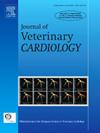曲唑酮对犬心率、心率变异性和qt间隔的影响
IF 1.3
2区 农林科学
Q2 VETERINARY SCIENCES
引用次数: 0
摘要
前言/目的探讨曲唑酮和安慰剂对口服曲唑酮或安慰剂后犬心率(HR)、心率变异性(HRV)和QT间期(QTi)的影响。动物、材料和方法20只健康的成年客户拥有的狗被纳入研究。在一项双盲、安慰剂对照的交叉试验中,狗被随机分组。狗接受曲唑酮(6 mg/kg q 8 h)或安慰剂治疗24小时,期间记录24小时动态心电图(Holter)。在24小时研究前后分别获得诊断性心电图和临床评估的行为评分。主人还对狗在24小时研究期间的行为变化进行了评分。在至少一周的洗脱期后,狗接受替代研究药物,并重复所有程序。采用线性和混合模型进行统计分析。结果曲唑酮组狗的平均心率(P=0.035)、最小心率(P < 0.001)和动态心电图HRV参数(P < 0.001)均显著升高。心电图衍生的QTi在两组间无差异。根据饲主评估(P<0.001)和行为评分(P=0.006),接受曲唑酮治疗的狗显得更平静。研究局限性:没有测量血压和曲唑酮水平,因此无法确定这些变量对HR和ECG结果的影响。结论司唑酮可提高心率,降低HRV。可能的解释包括先前描述的抗胆碱能作用或可能引起反射反应的血压降低。在使用标准曲唑酮剂量的健康犬群中,未发现对QTi的明显影响。本文章由计算机程序翻译,如有差异,请以英文原文为准。
Effect of trazodone on heart rate, heart rate variability, and QT-intervals in dogs
Introduction/Objectives
To determine the effect of trazodone and placebo on heart rate (HR), heart rate variability (HRV), and QT intervals (QTi) in dogs after oral administration of trazodone or placebo.
Animals, Materials and Methods
Twenty healthy adult client-owned dogs were included in the study. Dogs were randomized in a double-blind, placebo-controlled crossover trial. Dogs received trazodone (6 mg/kg q 8 h) or placebo for 24 h, during which a 24-h ambulatory electrocardiogram (ECG) (Holter) was recorded. Diagnostic ECGs and clinician-assessed behavior scores were obtained before and after the 24-h study period. Owners also scored the dog's behavior changes during each of the 24-h study periods. Following a minimum one-week washout period, dogs received the alternate study drug, and all procedures were repeated. Linear and mixed models were used for statistical analyses.
Results
Dogs receiving trazodone had higher average HRs (P=0.035), higher minimum HRs (P<0.001), and reduced HRV parameters (P<0.001) on the Holter recordings. Electrocardiogram-derived QTi was not different between groups. Dogs receiving trazodone appeared calmer based on owner assessments (P<0.001) and behavior scores (P=0.006).
Study Limitations
Blood pressure and trazodone blood levels were not measured, making it impossible to determine the effect of these variables on the HR and ECG findings.
Conclusions
Trazodone increased HR and decreased HRV. Possible explanations include a previously described anticholinergic effect or a possible decrease in blood pressure causing a reflex response. No demonstrable effect on QTi was identified in this cohort of healthy dogs using standard trazodone dosing.
求助全文
通过发布文献求助,成功后即可免费获取论文全文。
去求助
来源期刊

Journal of Veterinary Cardiology
VETERINARY SCIENCES-
CiteScore
2.50
自引率
25.00%
发文量
66
审稿时长
154 days
期刊介绍:
The mission of the Journal of Veterinary Cardiology is to publish peer-reviewed reports of the highest quality that promote greater understanding of cardiovascular disease, and enhance the health and well being of animals and humans. The Journal of Veterinary Cardiology publishes original contributions involving research and clinical practice that include prospective and retrospective studies, clinical trials, epidemiology, observational studies, and advances in applied and basic research.
The Journal invites submission of original manuscripts. Specific content areas of interest include heart failure, arrhythmias, congenital heart disease, cardiovascular medicine, surgery, hypertension, health outcomes research, diagnostic imaging, interventional techniques, genetics, molecular cardiology, and cardiovascular pathology, pharmacology, and toxicology.
 求助内容:
求助内容: 应助结果提醒方式:
应助结果提醒方式:


